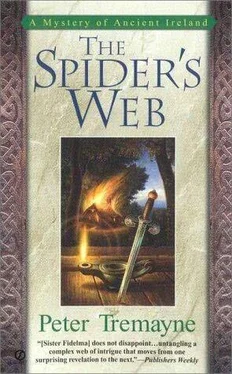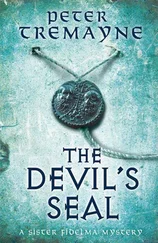Peter Tremayne - The Spider's Web
Здесь есть возможность читать онлайн «Peter Tremayne - The Spider's Web» весь текст электронной книги совершенно бесплатно (целиком полную версию без сокращений). В некоторых случаях можно слушать аудио, скачать через торрент в формате fb2 и присутствует краткое содержание. Жанр: Исторический детектив, на английском языке. Описание произведения, (предисловие) а так же отзывы посетителей доступны на портале библиотеки ЛибКат.
- Название:The Spider's Web
- Автор:
- Жанр:
- Год:неизвестен
- ISBN:нет данных
- Рейтинг книги:5 / 5. Голосов: 1
-
Избранное:Добавить в избранное
- Отзывы:
-
Ваша оценка:
- 100
- 1
- 2
- 3
- 4
- 5
The Spider's Web: краткое содержание, описание и аннотация
Предлагаем к чтению аннотацию, описание, краткое содержание или предисловие (зависит от того, что написал сам автор книги «The Spider's Web»). Если вы не нашли необходимую информацию о книге — напишите в комментариях, мы постараемся отыскать её.
The Spider's Web — читать онлайн бесплатно полную книгу (весь текст) целиком
Ниже представлен текст книги, разбитый по страницам. Система сохранения места последней прочитанной страницы, позволяет с удобством читать онлайн бесплатно книгу «The Spider's Web», без необходимости каждый раз заново искать на чём Вы остановились. Поставьте закладку, и сможете в любой момент перейти на страницу, на которой закончили чтение.
Интервал:
Закладка:
‘Retro Satana!’ It was Eadulf who breathed the words, raising a hand to genuflect.
‘Satan it is, brother,’ Dubán agreed in humourless tones.
The figure was that of a male. It was so covered in dirt and excrement, the hair so wild and matted, that they could not clearly discern its features. Fidelma had the impression that it was not elderly. Then she recalled that Crón had said that Móen was only twenty-one years old. The mouth was a wide slobbering aperture and a terrible moaning noise continued to issue forth. But it was the eyes that held the attention of both Fidelma and Eadulf. Thosepitiful white opaque orbs with scarcely any sign of a pupil at all.
‘Is this Móen who is accused of killing Eber and Teafa?’ whispered Fidelma aghast.
‘Indeed it is.’
‘Móen,’ muttered Eadulf grimly. ‘Of course! Doesn’t the very name mean one who is dumb?’
‘You have the right of it, brother,’ agreed Dubán. ‘Dumb has he been since he was found and given a home by the lady Teafa.’
‘And sightless?’ queried Fidelma, staring in horrified pity at the figure crouching before her.
‘And deaf,’ Dubán added grimly.
‘And it is claimed that such an unfortunate could kill two healthy beings?’ breathed Fidelma in disbelief.
Eadulf stared at the creature with distaste.
‘Why were we not told about the condition of this person before?’
The warrior looked surprised.
‘But everyone knows Móen. It never occurred to me that …’
Fidelma silenced his protests.
‘No. It is not your fault that I have not been informed before now. Let us be perfectly clear; am I to understand that it is this deaf, dumb and blind creature who is charged with the slaughter of Eber and …’
She paused for the figure had moved cautiously forward and was holding his head up like an animal, his nostrils flaring. He was sniffing. Fidelma stared down at him as he approached near to her on all fours.
‘I would stand back a little, sister, for he smells people even if he can’t see or hear them,’ warned Dubán.
It was too late, for a cold, dirty hand suddenly stretched out and touched Fidelma’s foot. She started back in alarm.
Móen stopped abruptly.
Dubán moved towards him, one hand holding the lamp while the other was raised as if to strike the unfortunate.
Fidelma saw the action and reached out a hand.
‘Do not strike him,’ she commanded. ‘You cannot strike one who cannot see the blow.’
Indeed, it was just as well for Móen was sitting his face upturned and now he had raised his hands, waving them in curious motions before him.
Fidelma shook her head sadly.
‘Ignore him, sister,’ muttered Dubán, ‘for he is cursed by God.’
‘Can you not have him cleaned at least?’ demanded Fidelma.
Dubán looked astonished.
‘For what purpose?’
‘He is a human being.’
The warrior grimaced sarcastically.
‘Not that you would notice it.’
‘According to the law, Dubán, you have already committed an offence by mocking someone who has a disability.’
The warrior opened his mouth to protest but Fidelma went on grimly, ‘I want him clean before I next see him. You may still confine him but he must be given food and water and be cleaned. I will not see one of God’s creatures suffer this way. Whatever they have been accused of.’
She turned on her heel and strode from the stable. Eadulf hesitated a moment; he felt an unease as he watched the bitter emotions chase themselves across the middle-aged warrior’s face as he stared after Fidelma.
Fidelma was standing outside breathing deeply as if in an effort to control her anger. There was now no sign of the other warrior, Crítán. They hesitated a moment before walking slowly in the direction of Eber’s apartments.
‘One cannot blame Dubán,’ Eadulf tried to act as conciliator. ‘And remember, this poor creature, as you call him, did kill Eber, his chieftain.’
He almost winced as Fidelma’s green eyes suddenly blazed at him with an angry fire.
‘Móen’s guilt has first to be proved. He is a human being and has the same rights before the law as everyone else. In the meantime there is no excuse to treat him as if he were less than an animal.’
‘True,’ conceded Eadulf. ‘He should not be treated in such a way but …’
‘He has a right of defence before being judged guilty or not.’
Eadulf raised a shoulder and let it fall in an expressive gesture.
‘Deaf, dumb and blind, Fidelma. How can one communicate with such a being in order to find out what defence they can present?’
‘If there is a defence, I shall find it. But he will not be condemned without a fair trial. On my oath as an advocate of the laws of the five kingdoms, I shall ensure it.’
There was an awkward silence and then Eadulf asked: ‘Is there really a law imposing penalties on anyone who mocks the disabled?’
‘I do not make up laws,’ Fidelma replied stiffly, still irritated. ‘Heavy fines can be imposed on anyone who mocks the disability of any person from an epileptic to a lame person.’
‘It is hard to believe, Fidelma, even though I had studied in this land of yours, I am still a prisoner of my own culture. In our society we recognise that man is a cruel creature and that God often ordains him to live short and brutish lives. It is in the holy order of things that, in the violence of nature, man has a violent path.’
Fidelma stared at him in surprise.
‘You have seen the alternative in our society, Eadulf. You surely do not believe that the Saxon way is the only way?’
‘Any way is only transitory. Life is subject to sudden change. On every side there is pestilence, famine, oppression, violence from personal or political enemies. We resign ourselves to the dispensation of the inscrutable will of the Father in the heavens where all our security lies.’
Fidelma shook her head.
‘Time to argue such a philosophy later, Eadulf. Our laws and the way we conduct our lives is surely an argument against the manifold misery of life you accept in your land? But before we debate the subject, there is this matter to be resolved. And it is a difficult one, Eadulf, and I need your support. Once I have gathered the evidence, and if the blame does lie at the door of this unfortunate then I will have to decide whether he has any legal capacity in law. Such a disabled person is not subject to distraint and one has to act against the legal guardian. So we must discover who is the legal guardian of this creature, Móen. Ah,’ she paused and rubbed her head, ‘I must try to recall the words of the text Do Brethaib Gaire …’
‘What is that?’ demanded Eadulf.
‘On the judgments of maintenance which is a tract on the kin’s obligation to care for its incapacitated members. The first part deals with the care of the deaf, blind and dumb.’
Eadulf was always bemused by the Irish laws of compensation to the victim and their family even for murder. In his land of the South Folk, the death penalty was enacted even for thieves and those who harboured and supported them. Murderers, traitors, witches, absconding slaves, outlaws and those who protected them could be hanged, beheaded, stoned, burnt or drowned, while lesser penalties consisted of mutilations; the cutting off of hands, feet, nose, ears, upper lip or tongue, even blinding, castration and scalping as well as branding and scouring. Eadulf knew that the Saxon bishops preferred to mete out the punishment of mutilation rather than death for it gave the sinner time to repent. But these Irish with their refusal to accept the satisfying concept of revenge but who talked of compensating the victim by putting the wrongdoer to useful work … well, it was humane but he often wondered whether it was an appropriate justice.
Читать дальшеИнтервал:
Закладка:
Похожие книги на «The Spider's Web»
Представляем Вашему вниманию похожие книги на «The Spider's Web» списком для выбора. Мы отобрали схожую по названию и смыслу литературу в надежде предоставить читателям больше вариантов отыскать новые, интересные, ещё непрочитанные произведения.
Обсуждение, отзывы о книге «The Spider's Web» и просто собственные мнения читателей. Оставьте ваши комментарии, напишите, что Вы думаете о произведении, его смысле или главных героях. Укажите что конкретно понравилось, а что нет, и почему Вы так считаете.











